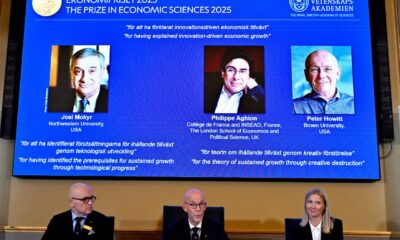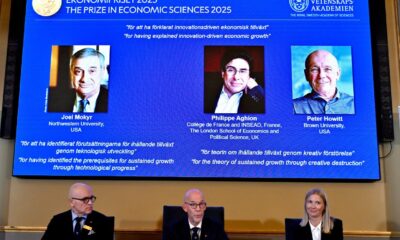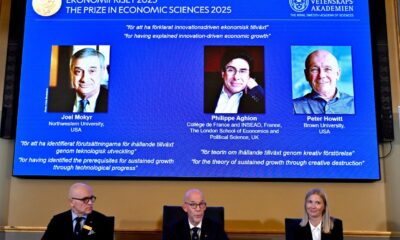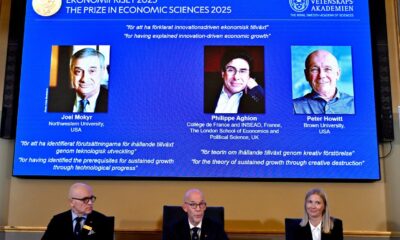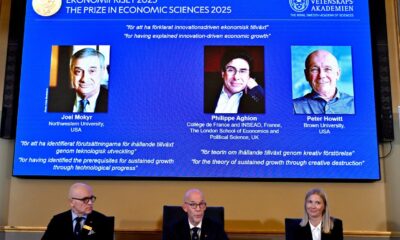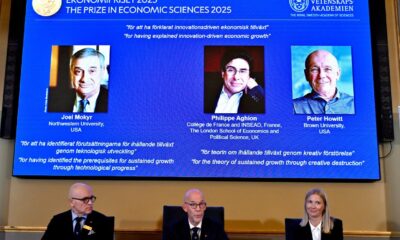Science
Economists Win Nobel Prize for Insights on Creative Destruction
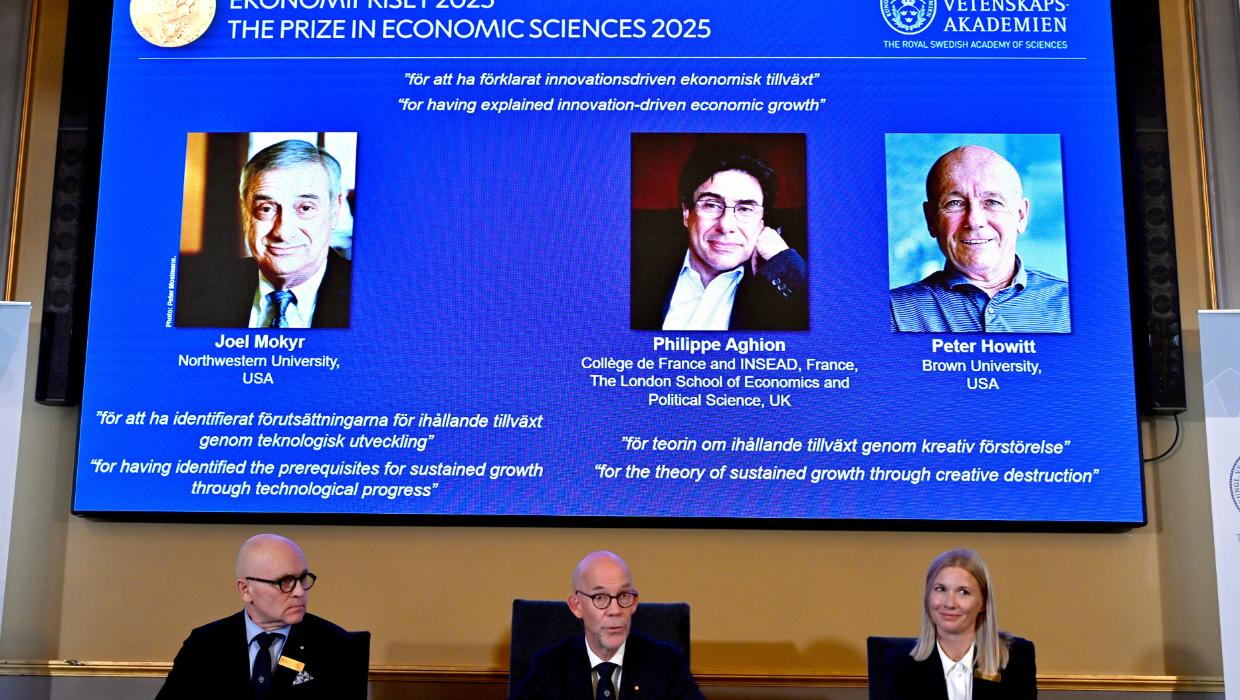
Three distinguished economists were awarded the Nobel Memorial Prize in Economics on March 10, 2023, for their groundbreaking research in understanding the dynamics of business innovation and its role in economic growth. The awardees, Joel Mokyr, Philippe Aghion, and Peter Howitt, were recognized for their contributions to the concept of “creative destruction,” which describes how new products and technologies can replace older businesses, ultimately benefiting economic development and human welfare.
The Nobel committee highlighted that their work significantly enhances the understanding of how innovation disrupts established markets. This process has historical precedents, such as the transition from horse-drawn wagons to steam locomotives, as well as modern examples like e-commerce’s impact on traditional retail.
Exploring Creative Destruction
The concept of creative destruction, initially popularized by economist Joseph Schumpeter in his 1942 work “Capitalism, Socialism and Democracy,” serves as a foundational theory in economics. The Nobel committee noted that Mokyr’s research illustrated that successful innovations must not only work effectively but also require scientific explanations for their success.
Aghion and Howitt have contributed significantly to the mathematical modeling of creative destruction. Their 1992 article introduced new elements to the existing framework, providing deeper insights into how sustained economic growth can be achieved. The committee underscored that examples of creative destruction are prevalent in today’s economy, with streaming services and digital advertising transforming traditional media and entertainment industries.
John Hassler, chair of the committee for the prize in economic sciences, emphasized that the laureates’ findings reveal that economic growth must not be taken for granted. He stated, “We must uphold the mechanisms that underlie creative destruction, so that we do not fall back into stagnation.”
Implications for Modern Economies
Aghion and Howitt’s research indicates that monopolistic or oligopolistic market structures can hinder innovation and growth. This concern is particularly relevant in industries such as telecommunications, social media, and airlines. Their findings stress the importance of supporting individuals affected by technological changes while facilitating transitions to more productive employment opportunities.
Mokyr has often argued for the positive potential of technological innovation, countering the more pessimistic views held by some economists regarding the impact of recent advancements like smartphones and the internet. He pointed out that the economic benefits of many modern services, which are often inexpensive or free, may not be reflected in traditional economic data.
In a 2015 interview, Mokyr cited the music streaming service Spotify as an example of an “absolutely astonishing” innovation that has transformed music consumption, allowing access to vast libraries for a nominal fee.
The Nobel committee also acknowledged that throughout much of human history, economic stagnation has been the norm. However, the Industrial Revolution marked a shift towards sustained growth, highlighting the critical role of innovation in driving economic progress.
Aghion noted that Europe faces a pressing challenge in maintaining competitiveness with the U.S. and China, particularly in digital technology. He called for a renewed focus on research and venture capital to foster innovation. “We have to wake up,” Aghion stated. “Because you know who will win in this competition? Those who innovate.”
Mokyr expressed optimism regarding the potential of artificial intelligence (AI) to drive growth, emphasizing the need for effective institutional frameworks and policies that encourage competition. He dismissed fears that AI could lead to widespread job losses or societal collapse, framing it instead as a powerful tool for enhancing productivity.
Reflecting on the Award
Both Mokyr and Howitt shared their surprise at receiving the Nobel Prize. Mokyr recounted waking up early to discover congratulatory messages and later receiving the call confirming his win. “I think I sat there for 15 minutes, sort of dazed,” he remarked.
Howitt’s revelation came when a Swedish reporter contacted him while he was still waking up. Initially skeptical, he laughed off the surprise, saying, “We had no Champagne in the refrigerator. We were not anticipating this.”
The Nobel Prize, which consists of 11 million Swedish kronor (approximately $2.02 million), will be distributed between Mokyr and Aghion and Howitt, who will share the other half. Each laureate also receives an 18-carat gold medal and a diploma, formally awarded during the ceremonies on December 10, commemorating the anniversary of Alfred Nobel’s death in 1896.
As the laureates look forward to further contributions to the field, their work serves as a vital reminder of the importance of innovation in driving economic growth and improving human welfare across the globe.
-

 World6 days ago
World6 days agoPrivate Funeral Held for Dean Field and His Three Children
-

 Top Stories1 week ago
Top Stories1 week agoFuneral Planned for Field Siblings After Tragic House Fire
-

 Sports3 months ago
Sports3 months agoNetball New Zealand Stands Down Dame Noeline Taurua for Series
-

 Entertainment3 months ago
Entertainment3 months agoTributes Pour In for Lachlan Rofe, Reality Star, Dead at 47
-

 Entertainment2 months ago
Entertainment2 months agoNew ‘Maverick’ Chaser Joins Beat the Chasers Season Finale
-

 Sports3 months ago
Sports3 months agoSilver Ferns Legend Laura Langman Criticizes Team’s Attitude
-

 Sports4 weeks ago
Sports4 weeks agoEli Katoa Rushed to Hospital After Sideline Incident During Match
-

 Politics2 months ago
Politics2 months agoNetball NZ Calls for Respect Amid Dame Taurua’s Standoff
-

 World2 weeks ago
World2 weeks agoInvestigation Underway in Tragic Sanson House Fire Involving Family
-

 Entertainment3 months ago
Entertainment3 months agoKhloe Kardashian Embraces Innovative Stem Cell Therapy in Mexico
-

 Sports4 weeks ago
Sports4 weeks agoJamie Melham Triumphs Over Husband Ben in Melbourne Cup Victory
-

 World4 months ago
World4 months agoPolice Arrest Multiple Individuals During Funeral for Zain Taikato-Fox

